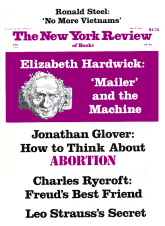In response to:
'Prich': A New Deal Memoir from the March 28, 1985 issue
To the Editors:
The interesting memoir of Edward Prichard by Arthur Schlesinger, Jr. [NYR, March 28], recounts a striking anecdote regarding an error Prichard made as a law clerk to Justice Frankfurter. According to Prichard’s story, he had allowed Frankfurter to cite an opinion that had in fact been overruled. The anecdote suggests that historians should use caution in relying on tales told by accomplished raconteurs such as Prichard.
I attempted to locate the case in the error was made by examining the Supreme Court’s reports on modifications of opinions in light of requests for rehearings and on decisions granting rehearings. I was unable to locate a case like that described in Prichard’s anecdote. My search does not eliminate the possibility that the events occurred as Prichard recounted them; Frankfurter may have relied on the overruled case for a peripheral point and thought it unnecessary to correct his opinion.
Nonetheless, with historians increasingly relying on oral history, I thought it worth pointing out that people who tell stories that catch the attention may end up remembering things that didn’t happen in quite as dramatic a way as they report.
Mark Tushnet
Georgetown University Law Center
Washington, DC
Jr. Arthur Schlesinger replies:
Professor Tushnet may have a good general point about oral history, bet he is quite wrong about this particular case. He evidently assumes that petitions for rehearing can have effect only when they are granted. Had he pursued his research with proper care, he would have come upon the case of Oklahoma Packing Co. v. Oklahoma Gas & Electric Co., 309 US 4 (1940). Here is what Justice Frankfurter wrote in an opinion delivered on January 15, 1940:
The decision of the Supreme Court on Oklahoma in Community Natural Gas Co. v. Corporation Commission, 182 Okl. 137, 76 P. 2d 393, having been brought to the attention of this Court for the first time in the petition of respondents for a rehearing of the disposition made of this case in the opinion delivered on December 4, 1939, that opinion is hereby withdrawn and replaced by the opinion of this day.
The petition for rehearing is denied.
In short, Justice Frankfurter, instead of granting the petition for rehearing, chose to withdraw his old opinion and replace it by a new one.
Joseph Rauh, to whom I am indebted for the citation, has the most vivid memory of Prich’s disappearance when he neglected to Shepardize the Justice’s first opinion. So does Graham Claytor, who remembers Phil Graham’s explanation of Prich’s absence from Hockley on the day the petition for rehearing was received: “Prich has an acute case of Sheparditis.”
Next time Professor Tushnet should complete his homework before he rushes to judgment.
This Issue
May 30, 1985



